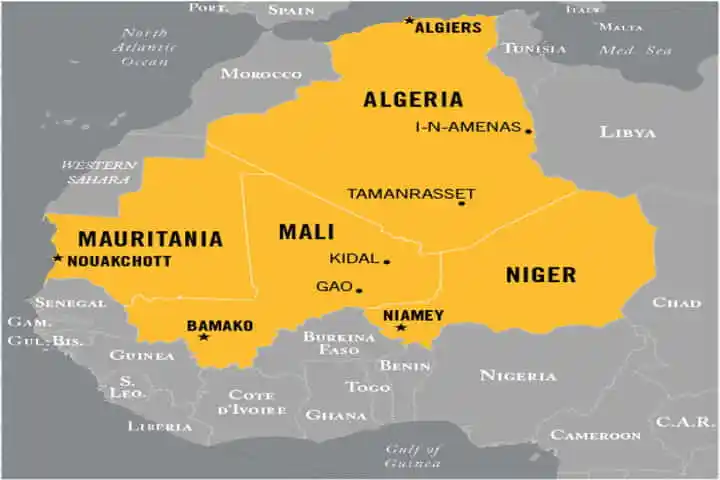

Taliban’s victory in Afghanistan has many African nations worried about its likely impact on the terrorism in Africa (Pic. Courtesy dni.gov)
<p>
<strong>Taliban&rsquo;s victory in Afghanistan has many African nations worried about its likely impact on the terrorism in Africa. When the Taliban took over Kabul, their triumph in Afghanistan was celebrated by many terror groups in Africa such as Somalia&rsquo;s Al-Shabaab and Al-Qaeda&rsquo;s affiliate group in West Africa, Jamaat Nusrat al-Islam wal-Muslimin (JNIM).</strong></p>
<p>
Al-Qaeda, Islamic State and many other terror groups are active in various parts of Africa and have grown in their reach, sophistication and impact in the last decade. African countries such as Somalia, Mali and Nigeria have been battling Islamist terrorists for years.</p>
<p>
To support counter-terror operations in Africa, major powers like France and the United States (US) have been engaged. France is a major security partner in anti-terror operations conducted across the Sahel region, spanning West and Central Africa.</p>
<p>
However, despite the collective efforts, the terror threat in many African countries has not waned in any significant way. In fact, Africa has emerged as the extremely fertile ground for the spread of terrorism.</p>
<p>
The border region between Mali, Burkina Faso and Niger is particularly challenging. The United Nations&rsquo; peacekeeping mission in Mali is dubbed as the &ldquo;most dangerous peacekeeping mission.&rdquo; Similarly, it is difficult to contain terrorists operating around the Lake Chad basin where borders of Nigeria, Niger and Chad converge.&nbsp;&nbsp;</p>
<p>
As France plans to reduce its troop presence in the region from about 5000 to 2500 by early next year, terror groups see it as their victory against the foreign forces. It is a well acknowledged fact that foreign support and French troops are crucial in the fight against Islamist terrorists in the Sahel region. There are parallels to be seen between the reduction of French troop presence from the Sahel and American troop withdrawal from Afghanistan.&nbsp;&nbsp;&nbsp;&nbsp;</p>
<p>
Even Chad, an important regional partner in the counter-terror operations conducted across the region, is planning to reduce its troop presence by half from the G-5 Sahel forces. Five Sahel states, Burkina Faso, Chad, Mali, Mauritania and Niger, are collaborating to curb terrorism in the G-5 framework.&nbsp;</p>
<p>
Chad is fighting rebels at home and the troop withdrawal from G-5 Sahel forces is also necessitated for that purpose. The Chadian military is considered as the capable force in the Sahel region and therefore, the exit of Chadian forces along with the French troops is likely to adversely affect the anti-terror operations.</p>
<p>
French withdrawal is likely to affect Mali the most. It was the failure of Malian troops in 2012-13 to stop the advancing Islamist forces from the North that prompted the French intervention in a major way. Many believe that the situation in Mali and Afghanistan are comparable wherein just like Afghanistan, Mali has a weak state structure which is critically dependent on foreign support.</p>
<p>
In East Africa, Al-Shabaab, operating out of unstable Somalia, remains a potent threat. In the late 1990s, Al-Qaeda terrorists in East Africa had attacked US embassies in Kenya and Tanzania, which killed hundreds. Even now, Somalia&rsquo;s fragile state and weaker internal security capabilities are likely to be exploited by the Al-Shabaab.&nbsp; Islamists have also gained ground in northern Mozambique and are operating in the Democratic Republic of Congo (DRC) as well.&nbsp;&nbsp;</p>
<p>
The foreign support including military assistance, training and targeted air strikes are essential for containing the terror threat emerging out of Somalia.</p>
<p>
With the victorious Taliban in Afghanistan, East African states are also worried about the potential rise of illicit trade of drugs as Afghanistan is one of the largest producers of heroin. In the last few years, East and Southern Africa&rsquo;s coastline has emerged as an integral part of the drug smuggling route known as the &lsquo;southern route&rsquo;. Through this route, heroin from Afghanistan is sent to the western markets.</p>
<p>
The consumer markets for heroin are growing in the East and Southern African region. Smuggling networks have links with criminal activities in East Africa as well. Previously, the US-supported Afghan government was taking measures, albeit unsuccessfully, to curb poppy cultivation. East African states are now worried that with the Taliban in charge of Afghanistan; heroin smuggling is likely to go up. Some elements of Taliban, especially those in southern Afghanistan, have deep links with drug smuggling and in fact, as per reports, they make money through the drug trade.&nbsp;&nbsp;</p>
<p>
There are lessons to be learnt from the recent developments in Afghanistan. Security experts are advising African governments to take corrective steps to ensure that terrorists do not gain further ground. There is a view that the reduction of French forces from the Sahel is an ominous signal for the counter-terror efforts. France should rethink the decision to reduce its troop presence.</p>
<p>
Moreover, fixing issues such as governance deficit, generating economic development and creating opportunities for the local population to improve their quality of life is key in the fight against terrorism. The link between development and security cannot be missed. Only military solutions will not solve the long-term causes which help the terror groups in their recruitment.</p>
<p>
<strong><em>(This is a shortened version of the original article by the author that appeared at the Indian Council of World Affairs website. Read the original article here. Views expressed are personal)</em></strong></p>
The 13th edition of the India-Italy Military Cooperation Group (MCG) meeting was successfully conducted from…
Taiwan's Coast Guard Administration (CGA) issued a strong condemnation of China for supporting illegal fishing…
Naseem Baloch, Chairman of the Baloch National Movement (BNM), appealed for unity among "oppressed nations"…
The Production Linked Incentive (PLI) scheme for telecom and networking has generated export sales exceeding…
Prime Minister Narendra Modi on Saturday reaffirmed India's commitment to conserve water and promote sustainable…
Baloch Human rights leader Mahrang Baloch was arrested by Pakistan's Quetta Police and administration early…